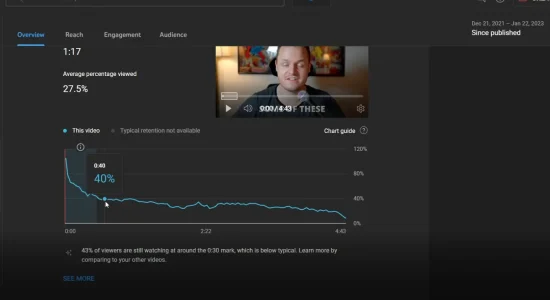Investing in the stock market is a great way to build your wealth; however, many find it difficult to succeed in it. I’ve had to listen to investors talk about how the stock market is a sham, as they couldn’t quite manage to hack it, but in my experience, the issue lies in their investing habits.
Here are ten reasons why making money in the stock market is hard:
- Market cycles and global events affect investments.
- Investors are emotional.
- Investors want instant gratification.
- Investors don’t receive quality education.
- Investors imbibe a herd mentality.
- Investors don’t research assets well enough.
- Investors often fail to diversify.
- It’s easy to complicate things.
- People mistake trading with investing.
- People seek excitement from the market.
Do you feel like making money from the stock market is impossible? In the following sections, I’ll go through the above points in more detail to help you see why you may be struggling.
1. Market Cycles and Global Events Affect Investments
Your investments will rise and fall in line with fluctuations in the global economic landscape. Economic cycles are in a perpetual dance between decline and expansion. A healthy job market, a growing economy, and other such positive indices of growth fuel an expansion.
Rising inflation slows GDP growth, pushing an economic decline that also affects the stock markets. Unfortunately, many investors don’t understand these cycles. Therefore, they tend to jump in at the peak of the expansion cycle and exit quickly at any sign of decline.
After the September 17, 2001 attacks in the US, the stock market posted record losses. Exiting your investments that week may have led to losses if you bought a few weeks prior. However, it only took a month for the market to recover to pre-attack levels, reversing all drawdowns.
Therefore, sitting tight in the market-wide decline phase is the savvier approach to investing in the stock market instead of turning tail at the first sign of a drawdown.
Unfortunately, the latter is the immediate reaction of many, so it’s difficult to make money from the market.
2. Investors Are Emotional
People lose money in the stock market because they let fear and greed drive their investing. When a specific asset goes on a protracted bullish run, I often see people exiting their other investments to increase their exposure to said asset.
Similarly, at the first sign of a drawdown, they run for the hills, losing money on the investment and paying transaction fees unnecessarily.
Even worse, fear and hope make some investors continue to add more money as the stock declines, hoping for a reversal. This approach rarely ends well on most volatile stocks. The most robust assets like Tesla or Apple will make a recovery, but how long are you willing to wait?
Over the last six months, Apple and Tesla experienced 17% and 35% drawdowns, respectively. Piling in more money at every new low they print would be a losing strategy thus far.
If you tried the same all-in approach on former stock market darlings like Peloton, you’d be sitting in a 71% drawdown that you may never recover from.
The best stock traders follow a laid-down investment strategy. They don’t jump in or out on a whim, and they certainly don’t go all-in on any stock. Curbing greed and fear is one of the first steps to making money from the market.
3. Investors Want Instant Gratification
In the same vein, making money from the stock market can be challenging because investors want to get rich quickly. As a result, they adopt strategies that promise quick returns, such as day trading and penny stock investing.
However, these strategies only work for a select few. For example, the average investor using such strategies will make far less money than others who buy and hold the S&P 500.
Traders who make money from the stock market stick to a progressive, “slow and steady” plan. They don’t buy into any systems promising quick riches.
If you don’t have enough money yet to make slow and steady investing worth it, you should save more money and continue investing.
4. Investors Don’t Receive Quality Education
Knowing how to open and close orders only scratches the surface of stock investing.
You need to know what makes specific assets tick, learn proven strategies that work, and deploy them in your trading.
You also need to know the basics of market movement. You don’t need a finance degree to become a stock investor, but without a basic understanding of market concepts, it’s like groping in the dark and hoping to grab a portion of the wall with the light switch in an unfamiliar room.
5. Investors Imbibe a Herd Mentality
The cryptocurrency market brought the severity of herd mentality in the finance world to light, but the phenomenon has always existed in the background, even in the stock market. People listen to analysts on TV and online and take their word as gospel.
However, investing in an asset based on the number of times you hear about it daily is the wrong approach. Your colleagues, friends, relatives, and the suit-wearing analysts on social media (and TV!) most likely don’t know much more about the stock market than you do.
Following their “tips” often ends in losses. Predicting the stock market (or any other market) is difficult. Even qualified professionals with degrees get more predictions wrong than they get right.
Similarly, jumping into an asset because you saw someone post profits actualized from it on the internet is a big mistake. They probably understand the asset better than you do. In some cases, they just got lucky.
Jumping in to grab your share of profits often ends badly. Since you don’t have any real conviction for buying the asset, any quick drawdowns after your investment can push you into knee-jerk reactions like exiting or adding more money to force recovery.
Successful investors always stick to proven strategies for picking assets, they don’t follow the crowd.
6. Investors Don’t Research Assets Well Enough
If you don’t study assets well enough before investing, you’re essentially gambling. It’s not enough to look at the company name or industry. You have to go deep into the company’s specific fundamentals.
When was the company founded? Are they profitable? Is the product or business model sustainable? These are some examples of due diligence questions you need to ask as a savvy investor, and we haven’t even scratched the surface yet.
Successful stock investors only invest money in companies they know very well.
7. Investors Often Fail To Diversify
One of the first things you’ll learn as you continue the transition to becoming an experienced investor is that diversification is key to success. A properly diversified portfolio absorbs market-wide corrections, a bear market, and a rough economy much better.
The main aim of diversification is to select assets from a good spread of uncorrelated industries and sectors. This is the best way to reduce long-term risk. For example, a portfolio of ten tech stocks will have deeper troughs than one with three tech stocks, two real estate, three banking, and two retail companies.
Keep in mind that diversification will not completely remove losses from the equation. It only reduces the risk, allowing your return curve to reach all-time highs faster following a drawdown.
Going all-in on correlated assets means that a slight downturn can wipe out your returns and increase the probability of losing some of your capital.
8. It’s Easy To Complicate Things
Making money in the stock market is challenging because it’s easy to complicate investing. Adding too many assets to your portfolio, tinkering with it regularly, and looking for random approaches on making money are all easy ways to complicate the portfolio.
Again, successful investors find a working strategy and stick to it. They always choose strategies that agree with their personality. If you like the slower-paced lifestyle, adding day-trading to your investment strategy will do more harm than good.
Similarly, if you want to be actively involved and take short-term bets on market direction, then day-trading or the futures market may be best for you.
If you don’t have any strategies, it may be best to pay an adviser to manage your portfolio. However, the management fees may be prohibitive, and the returns don’t always justify the expenses.
A good alternative is Robo-investing. Here, an algorithm will evaluate your investment habits and recommend suitable assets.
9. People Mistake Trading With Investing
I often see wannabe stock investors ogling profit posts on social media made by futures or CFDs traders. When these people jump into the stock market off the back of these posts, they are disappointed. Leveraged stock CFDs or futures are highly volatile instruments.
You need a lot of experience and training to navigate those murky waters. There’s a reason less than 15% of CFD traders make money any given year. Without the right level of expertise, you’ll find the rigors of managing the volatility and short trading time frames too daunting.
You should also remember that you don’t own the stocks in CFDs and futures trading. If you buy 20 lots of MSFT on a CFD platform, you will make or lose $200 for every one-point move the asset moves in or against your direction.
It’s a bet between you and the brokerage on the direction of the asset. In futures trading, there’s a time frame limit as well. The move must be complete (or not) within the fixed time frame, or you’ll lose the entire stake or a portion of it.
In CFDs, you won’t lose everything unless the asset moves too deep away from your entry point.
So, trading is very different from investing. In investing, you buy a stake in the company. You own the asset directly.
The value of your portfolio will fluctuate over time, but you won’t realize any losses if you don’t sell. If the asset composition is sound, it will rebound over the long term.
10. People Seek Excitement From the Market
Over the last few years, the investment world has seen a lot of hysteria and excitement. Early crypto backers and holders of volatile stocks like Tesla enjoyed outsized returns, drawing new market entrants. Unfortunately, the stock market, in general, is boring.
You will not make three-digit returns every year, never mind four digits, as we see in the crypto market. So, people become stock investors and frantically refresh their apps every day, hoping for a massively exciting movement.
When they don’t find the excitement, they start looking for ways to force it. In many cases, it leads to destructive investment behaviors or dabbling into unproven and unrealistic strategies.
The stock market is boring if you want to be an investor in the real sense of the word. The S&P 500 returns an average of 10% per year (58% in the last five years). That’s boring compared to 958% of Bitcoin or 1009% of Tesla. Right?
However, here’s a look at the five-year maximum drawdown on the three assets:
| Asset | Max Drawdown |
| S&P 500 | 31% |
| Tesla | 43% |
| Bitcoin | 68% |
So, while other assets are more exciting, they are far more volatile and likely to remain in drawdown for longer periods. Bitcoin is currently in one of its deepest drawdowns, and there’s no telling when it will recover, if ever.
The S&P 500’s deepest drawdown in the last five years was due to the 2020 pandemic. Still, it recovered within the same year to reach new highs.
So, would you rather have a boring investment that doesn’t swing too wildly and will likely end in doubling your money in ten years, or would you choose one where you can double your money in a year or less but lose 80% of it in three weeks?
Your answer to that question will determine if stock trading is for you. It should also help you understand why the average person will struggle to make money in the stock market.






